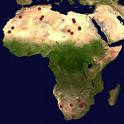Imperial Jockeying in Africa: U.S. Intervention Sets to Deepen

As “the peril of guerrilla war looms” for the French in Mali, the United States prepares to step-up its intervention across Africa.
Speaking in Bamako on Tuesday, U.S. Senator Christopher Coons, chairman of the Senate Foreign Relations Committee, stated that direct U.S. military support of the Malian government is likely to resume after the country’s July elections.
“After there is a full restoration of democracy,” Coons said, “I would think it is likely that we will renew our direct support for the Malian military.”
(The U.S. suspended direct military aid to Mali following a coup last year by a U.S.-trained Malian officer.)
Coons went on to deem al-Qaeda in Islamic Maghreb (AQIM) a “‘very real threat’ to Africa, the United States and the wider world.”
According to U.S. intelligence officials, however, AQIM “remains mainly a regional menace,” with “no capacity” to launch attacks within the U.S. Even so, the Pentagon continues to move closer to directly targeting AQIM targets.
As was first reported by the New York Times, the U.S. is currently in the midst of establishing a drone base in Niger. The base will reportedly host up to “300 United States military and contractor personnel.”
“U.S. officials say they envision flying only unarmed surveillance drones from the base,” the Times reported, “though they have not ruled out conducting missile strikes at some point if the threat worsens.”
But according to the Wall Street Journal, “at some point” is a moment which fast approaches, as senior U.S. officials are pressing to expand the U.S. “kill list” to include targets from northern Mali.
Meanwhile, in a prepared statement given to the U.S. Senate Armed Services Committee last week, U.S. Army Gen. David Rodriquez, who is poised to become the next commander of the U.S. military’s Africa Command (AFRICOM), argued that greater U.S. intervention into northwestern Africa is necessary for “stability.”
“With the increasing threat of al-Qaeda in the Islamic Maghreb,” Gen. Rodriquez wrote, “I see a greater risk of regional instability if we do not engage aggressively. Our long-term fight against al-Qaeda necessitates persistent engagement with our critical partners.”
Likewise, Sebastian Elischer in a recent Foreign Policy piece, titled “After Mali Comes Niger,” argues that “If the West wants prevent the Sahel from falling hostage to Tuareg and Islamist militants, longer-term military and financial engagement is urgently required.”
Of course, Pentagon plans for Africa do indeed stretch well beyond northern Mali. A military doctrine of global “power projection” and “full spectrum dominance” dictates nothing less.
As part of his prepared remarks given to the Armed Services Committee, Gen. Rodriquez called for a 15-fold increase in U.S. intelligence-gathering missions in Africa. This comes despite the fact that the U.S. has already established “about a dozen airbases” across Africa dedicated to “intelligence-gathering” just since 2007.
Even more foreboding, though, Gen. Rodriquez went on to call for the U.S. to enhance its Special Operations presence in a total of ten African states (Libya, Niger, Tunisia, Algeria, Mauritania, Nigeria, Mali, Cameroon, South Sudan, and Kenya).
As an October report in the New York Times noted, the U.S. has already allocated $8 million to train a Libyan force of up to 500 special commandos. Yet as Christopher Chivvis of the Pentagon-friendly RAND Corp. writes, the U.S. needs to “take the lead” and do more in Libya, lest one wishes to imperil NATO’s hard won “stability.”
In addition to Libya, late last year AFRICOM announced plans to send 4,000 U.S. troops to nearly three dozen African states over the course of 2013 for the purpose of training African militaries. The training is reportedly aimed at helping “African troops beat back a growing terrorist threat posed by al-Qaida.”
The targeting of Islamic extremists and al-Qaeda, though, is but a pretext for the U.S. to contain Chinese interests in Africa. As Secretary of State John Kerry warned in his confirmation hearing, “China is all over Africa — I mean, all over Africa…And we got to get in.”
Indeed, for when asked whether the U.S. “pivot” to Asia would hamper AFRICOM’s mission, Gen. Rodriquez noted that, “The impact on the operations and activities of AFRICOM will be minimal. In fact, based on the interconnectivity between Africa and the Asia-Pacific region, AFRICOM’s activities may become more important.”
Of course, the U.S. adamantly denies it is seeking any confrontation with China. As outgoing AFRICOM Commander Gen. Carter Ham recently commented in a question and answer session at Howard University, “Militarily, we are absolutely not in an adversarial relationship at all with China in Africa. Economic competitors, I think absolutely.”
But the contradictions of global capitalism – namely, the cleavage between a world economy and a nation state system – threaten far more than peaceful economic competition between the U.S. and China. For imperialist economic competition begets military confrontation. As Lenin warned in his pamphlet Imperialism, even “a general alliance embracing all the imperialist powers… [is] inevitably nothing more than a ‘truce’ in periods between wars.”
This reality has already come to be recognized as a rising menace in East Asia by even the staunchest apologists of global capitalism.
It’s clear, then, that a renewed global race to secure markets and resources has begun in earnest. And as Lenin asked: “is there under capitalism any means of removing the disparity between the development of productive forces and the accumulation of capital on the one side, and the division of colonies and ‘spheres of influence’ for finance capital on the other side – other than by resorting to war?”
The deepening U.S. military intervention into Africa and “pivot” to Asia is evidence enough of the reply from the American elite. It appears the bloody road of imperial barbarism is not yet at its end.
Ben Schreiner is a freelance writer based in Wisconsin. He may be reached at [email protected] or via his website.

